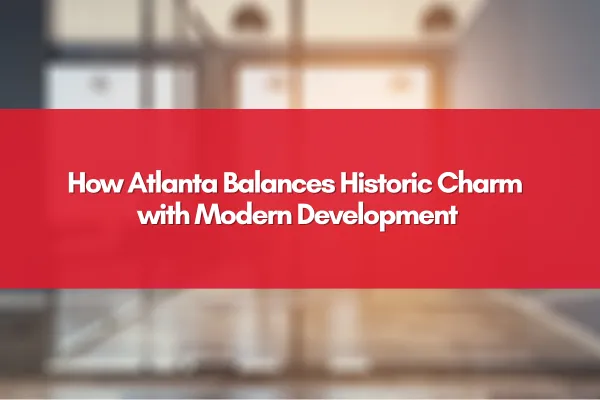
How Atlanta Balances Historic Charm with Modern Development
Living in Atlanta, Georgia, means embracing a rich tapestry of history woven into a thriving, modern city. The city’s neighborhoods tell stories of past eras, from cobblestone streets to Victorian homes, yet they also bustle with contemporary lifestyles. For anyone interested in the unique blend of preserving history while fostering modern development, Atlanta offers a compelling case study.
As a local expert, I want to explore how Atlanta manages this delicate balance and what it means for homeowners, investors, and community members. Let’s dive into the heart of Atlanta’s real estate evolution, revealing how the city keeps its historic charm alive amid rapid growth.
The Soul of Atlanta’s Historic Districts
Atlanta’s historic neighborhoods such as Inman Park, Virginia Highland, and Old Fourth Ward are treasures that showcase the city’s architectural evolution. These areas boast early 20th-century craftsman brickwork, stately Victorian homes, and charming bungalows. The city’s approach to preserving history in Atlanta real estate involves careful zoning, landmark designations, and incentives for restoration.
According to research from Cushman and Wakefield, Atlanta’s real estate industry is experiencing a significant shift reflecting a growing appreciation for historic properties. This movement is not just about maintaining buildings but about fostering community identity.
Preservation Meets Modern Development
Atlanta’s growth has been impressive. The city ranks among top markets nationally for new commercial and residential developments, attracting over 2000 acres of land banking, according to CBRE. Yet, developers and city planners are working to ensure new projects honor the city’s history.
For example, Atlanta’s Ponce City Market utilized historic warehouse buildings and transformed them into vibrant mixed-use spaces. This kind of adaptive reuse preserves the building’s historic significance while adding modern amenities.
The approach demonstrates how Atlanta integrates new development with historic preservation by encouraging innovative renovations rather than demolitions. This strategy maintains the city’s identity while accommodating a growing population.
Community-Led Preservation Initiatives
Local organizations, like the Atlanta Preservation Center, play vital roles in educating residents and protecting historic districts. Many neighborhoods have enacted preservation overlays, preserving the architectural integrity of entire blocks.
In addition, city policies offer incentives such as tax credits for restoring historic properties, making preservation financially feasible for owners. This philosophy aligns with Atlanta’s broader vision of sustainable development that respects its past.
The Impact of Modern Development on Neighborhoods
Modern development isn’t just about restoring old buildings. It also involves new constructions that harmonize with historic styles. This is evident in neighborhoods like the BeltLine corridor, where new housing and commercial projects integrate beautifully with existing historic districts.
The balance prevents urban sprawl and keeps Atlanta’s neighborhoods unique. Homebuyers are increasingly seeking properties that combine historic character with modern comforts.
Market Data and Trends
Recent data indicates Atlanta’s real estate market remains robust, with a notable interest in historic homes. The median sale price in historic districts has increased steadily, outpacing some suburban areas.
For instance, neighborhoods such as Kirkwood and Candler Park have seen a surge in property values, thanks partly to their historic appeal. At the same time, new developments like Midtown offer state-of-the-art condominiums alongside century-old buildings converted into luxury apartments.
Actionable Tips for Buyers and Investors
If you're considering buying or investing in Atlanta real estate, here are some insights:
Look for properties with preservation incentives, like historic tax credits, which can add tax benefits to your investment.
Consider the neighborhood’s growth potential. Areas around the BeltLine are expanding quickly while still retaining historic elements.
Consult local experts like Ken Price who understand the nuances of preserving history in Atlanta real estate and can guide you through the process.
The Future of Atlanta’s Historic and Modern Balance
Atlanta will continue to evolve, blending its historic charm with innovative development. Sustainable planning, community involvement, and thoughtful architecture will remain key.
The city’s commitment to preserving history in Atlanta real estate ensures that future generations can enjoy Atlanta’s unique heritage alongside modern amenities.
To learn more about Atlanta’s neighborhoods and how to find the perfect blend of historic character and modern comfort, visit my website or contact me directly.
Connect with Ken Price Today
If you’re interested in exploring Atlanta’s historic neighborhoods or planning your next real estate move, I’m here to help. Call 404-786-8295 or email [email protected] for personalized guidance.
Visit my website at kenpricesellsatlanta.com to discover listings that honor Atlanta’s history and embrace its future.
Let’s work together to keep Atlanta’s charm alive, one property at a time.
